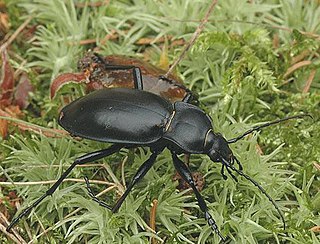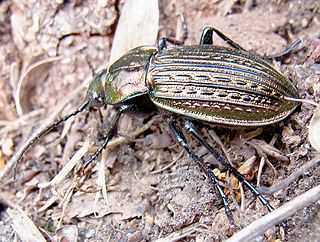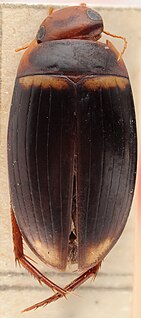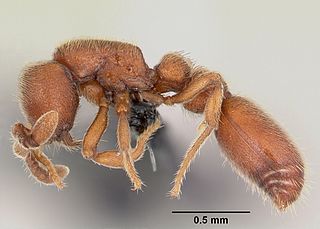
Carabus nemoralis is a ground beetle common in central and northern Europe, as well as Iceland and Canada. While native to Europe, it has been introduced to and is expanding its range throughout North America.

Carabus intricatus, the blue ground beetle, is a species of ground beetle found in Europe.

Carabus is a genus of beetles in family Carabidae. The genus is highly diverse with 91 subgenera and more than 1000 recognised species, thus is the largest genus in the subfamily Carabinae. The vast majority are native to the Palearctic, but 11 Nearctic species are also known. Carabus spp. are 12–50 mm (0.47–1.97 in) long, and most species are wingless and often very colourful. These are nocturnal, predatory beetles that feed on snails, earthworms, and caterpillars.

Carabus auronitens is a species of beetle in family Carabidae which was described by Johan Christian Fabricius in 1792.

Carabus granulatus is a species of beetle. It is found across the Palearctic from Ireland to the Russian Far East and has been introduced to North America.It is widespread in Europe. C. granulatus lives in fields, prairies, taiga and in forests. Also along river margins, in fens, lakeshores, and upland peat. It is occasional in gardens.

Carabus smaragdinus is a species of beetle belonging to the family Carabidae.

Carabus ullrichi is a species of ground beetle from the family Carabidae found in Bulgaria, the Czech Republic, Germany, Great Britain, Hungary, Luxembourg, Moldova, Poland, Romania, Slovakia, Ukraine, and all of the republics of the former Yugoslavia. They are coloured black, with a green pronotum.
In the 10th edition of Systema Naturae, Carl Linnaeus classified the arthropods, including insects, arachnids and crustaceans, among his class "Insecta". Insects with hardened wing covers were brought together under the name Coleoptera.
Hervé de Toulgoët was a French entomologist. He specialised in moths of the families Arctiidae and Zygaenidae. He also studied the beetle genus Carabus. He was written about by Paul Thiaucourt and Jocelyne Navatte.

Carabinae is a subfamily of beetles in the family Carabidae, containing the following genera:

Copelatus biroi is a species of diving beetle. It is part of the genus Copelatus in the subfamily Copelatinae of the family Dytiscidae. It was described by Guignot in 1956.

Carabus blaptoides is a species of ground beetle in the family Carabidae that can be found in Japan and Russia. The species are black coloured, but could have either purple or green pronotum.
Carabus exiguus is a species of black-coloured ground beetle in the Carabinae subfamily that is endemic to China.

Carabus hummeli is a species of ground beetle in the subfamily Carabinae that can be found in Russia and the eastern Palearctic realm. The species are brown coloured with blue pronotum. They also can be found in such Asian countries as China, Mongolia, and North Korea.
Carabus marietti is a species of ground beetle in the Carabinae subfamily that can be found in Bulgaria, European part of Turkey, and Near East.
Carabus obsoletus is a species of black-coloured beetle from family Carabidae, found in Czech Republic, Hungary, Moldova, Romania, Slovakia, Ukraine.

Carabus sylvestris is a species of either black or brown-coloured ground beetle in the Carabinae subfamily that can be found in Austria, Czech Republic, Hungary, Italy, Liechtenstein, Poland, Romania, Slovakia, Slovenia, Ukraine, and the Netherlands.
Carabus albrechti is a species of either black or brown coloured ground beetle in the subfamily Carabinae that is endemic to Japan.

Albunea carabus is a rare species of "sand crab" or "mole crab" in the genus Albunea. It lives in shallow, turbulent waters in sandy areas of the tropical eastern Atlantic Ocean and the Mediterranean Sea.

Ooceraea biroi, the clonal raider ant, is a queenless clonal ant in the genus Ooceraea. Native to the Asian mainland, this species has become invasive on tropical and subtropical islands throughout the world. Unlike most ants, which have reproductive queens and mostly nonreproductive workers, all individuals in a O. biroi colony reproduce clonally via thelytokous parthenogenesis. Like most dorylines, O. biroi are obligate myrmecophages and raid nests of other ant species to feed on the brood.












